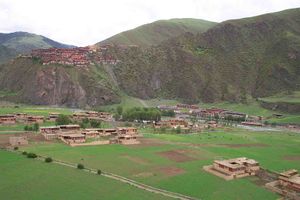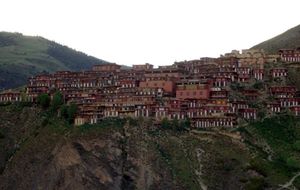Dzongsar Monastery: Difference between revisions
mNo edit summary |
No edit summary |
||
| (47 intermediate revisions by 6 users not shown) | |||
| Line 1: | Line 1: | ||
[[Image:Dzongsar and village.jpg|thumb|Dzongsar and village. Photo by Matthew Pistono]] | [[Image:Dzongsar and village.jpg|thumb|Dzongsar and village. ''Photo by Matthew Pistono'']] | ||
[[Image:Dzongsar.jpg| | [[Image:Dzongsar.jpg|thumb|Dzongsar Monastery. ''Photo courtesy of Stefan Eckel'']] | ||
'''Dzongsar Monastery''' (''rdzong gsar dgon pa'') | '''Dzongsar Monastery''' (Tib. རྫོང་གསར་དགོན་པ་, ''dzong sar gönpa'', [[Wyl.]] ''rdzong gsar dgon pa'') — a [[Sakya]] monastery in [[Derge]] which was the main seat of [[Jamyang Khyentse Wangpo]] and [[Jamyang Khyentse Chökyi Lodrö]]. The other main incarnations at Dzongsar were the Gongna and Ngari [[tulku]]s. | ||
==History== | ==History== | ||
Dzongsar Monastery was founded by [[Chögyal Pakpa]] on his return from China in 1275. Before this it had been a [[Nyingmapa]] and a [[Kadampa]] temple, and originally was the site of a [[ | '''Dzongsar Tibetan Buddhist Monastery''' was founded by [[Chögyal Pakpa]] on his return from China in 1275. Before this it had been a [[Nyingmapa]] and a [[Kadampa]] temple, and originally was the site of a [[Bön]]po shrine. Before 1958, Dzongsar had between 300 and 500 monks, but the whole surrounding area would be filled with tents whenever Jamyang Khyentse Wangpo or Jamyang Khyentse Chökyi Lodrö were in residence, with people camping for days or even weeks in the hope of gaining an audience with these great masters. All the temples were destroyed in 1958, but rebuilding began in 1983 under the guidance of Dr. [[Lodrö Puntsok]]. | ||
==Further Reading== | |||
===In Tibetan=== | |||
*[[Dilgo Khyentse Rinpoche]], ''rdzong gsar dgon pa'i lo rgyus'', Collected Works, vol., 4 pp. 369-372 | |||
==Internal Links== | |||
*[[Dzongsar Shedra]] | |||
*[[Dzongsar Tibetan Hospital]] | |||
*[[Dzongsar Khyentse Rinpoche]] | |||
*The [[Garden of Immortality]] | |||
== | ==External Links== | ||
*{{TBRC|G213|TBRC Profile}} | |||
[ | *[http://www.treasuryoflives.org/bo/institution/Dzongsar Treasury of Lives] | ||
*[http://info.tibet.cn/en/newfeature/dzongsar/text/t20050613_36405.htm The Lineage of Tulkus at Dzongsar] | |||
[[Category:Sakya Monasteries]] | |||
[[Category: | [[Category:Dzongsar]] | ||
Latest revision as of 22:40, 6 March 2018


Dzongsar Monastery (Tib. རྫོང་གསར་དགོན་པ་, dzong sar gönpa, Wyl. rdzong gsar dgon pa) — a Sakya monastery in Derge which was the main seat of Jamyang Khyentse Wangpo and Jamyang Khyentse Chökyi Lodrö. The other main incarnations at Dzongsar were the Gongna and Ngari tulkus.
History
Dzongsar Tibetan Buddhist Monastery was founded by Chögyal Pakpa on his return from China in 1275. Before this it had been a Nyingmapa and a Kadampa temple, and originally was the site of a Bönpo shrine. Before 1958, Dzongsar had between 300 and 500 monks, but the whole surrounding area would be filled with tents whenever Jamyang Khyentse Wangpo or Jamyang Khyentse Chökyi Lodrö were in residence, with people camping for days or even weeks in the hope of gaining an audience with these great masters. All the temples were destroyed in 1958, but rebuilding began in 1983 under the guidance of Dr. Lodrö Puntsok.
Further Reading
In Tibetan
- Dilgo Khyentse Rinpoche, rdzong gsar dgon pa'i lo rgyus, Collected Works, vol., 4 pp. 369-372